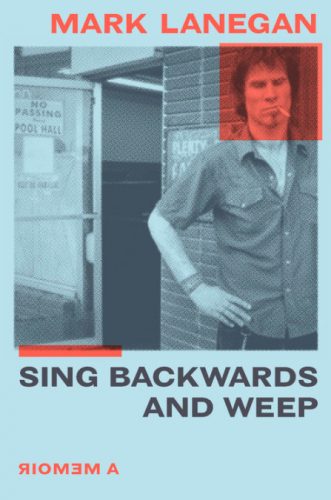
The Seattle music scene of the ’90s that gave rise to a slew of now legendary bands — Nirvana, Soundgarden and Pearl Jam, to name the most recognizable — was glorious to behold. It swept the Northwest like a flash flood, as the dam suddenly burst on years of hermetic creativity that burbled in moldy basements across this once sleepy, blue-collar outpost.
Rising tides, however, do not lift all boats, and along with the heady zeitgeist came a drowning swamp of sickness: alcoholism and heroin addiction, millennial despair, limelight nausea and way too many fatalities. A lonesome gothic darkness has always nipped at the Northwest’s heels, and the Seattle explosion exposed the enormity of its lumbering shadow. In an insidious way, death was always the subtext of Seattle’s cultural boom.
Nothing I’ve read so chillingly captures this creeping insular darkness as Mark Lanegan’s Sing Backwards and Weep, a memoir as brutal and claustrophobic as the junk-sick hell it narrates in every abscessed, obsessive detail. Equal parts anti-heroic confessional, slapstick comeuppance and authentic tragedy, this book is a harrowing portrait of addiction and loss, wrapped in the uncomfortable cloak of a two-bit rock stardom that resembles, at nearly every turn, a funhouse mirror of narcissism and cruelty.
Lanegan, a massively talented singer/songwriter whose beautiful baritone growl once fronted Screaming Trees (Sweet Oblivion remains one of my beloved albums from those years), is a distinctly Northwest product. Coming of age in the rural college town of Ellensburg, Washington, he was born an outcast, a sullen loner whose response to family dysfunction and redneck malaise was to channel his anger through increasingly criminal enterprises and, eventually, music. In this, he resembles his dear friend Kurt Cobain, whose talent likewise helped him escape the shithole of Aberdeen, a depressed former logging town.
Cobain’s is the only name I’m going to drop here. Lanegan’s memoir is loaded with familiar names and celebrity types, many of whom are subjected to takedowns so vicious and withering it made me wince, but to read this book as a tell-all of the “Seattle years” would be a very disappointing mistake. Certainly, there is an unhealthy dose of salacious stories and minor scandals — disastrous tours, on-stage meltdowns, backstage battles royale, the empty sexual greed that runs through women like another bag of dope — but they are an often uncomfortable sideshow to the real point of Lanegan’s narrative.
In a recent podcast with fellow musician Joseph Arthur, Lanegan said writing this memoir was perhaps the most unpleasant experience of his life. This claim provides perhaps the best clue to how the book should be read: as a deep and bloody dive into the prison of addiction, which wraps itself in seething self-loathing and insane grandiosity, all driven by an appetite that is quenched only by slowly killing one’s soul for yet more dope, just to avoid the agonies of withdrawal.
In this regard, Lanegan puts forth the ultimate unreliable narrator, a wounded and violent man whose interior monologue is a furious coil of self-justifications and self-hatred lashing out continuously at the world and everyone in it. Petty grievances immediately become lifelong blood feuds. Mean, vengeful and increasingly desperate, he depicts the addict’s mind with such woozy precision that you can’t help but be repulsed. This book is haunted by ghosts and littered with victims, but Lanegan’s descent is so furious that there’s barely time to register the damage.
The man should be dead, period, and he knows it, and this book is no apology. It is, instead, a remorseless, repulsive and occasionally hilarious glimpse into the addict’s insides and outsides, full of stories as abject and desolate as you will find just about anywhere. Lanegan’s voice alternates between anger and befuddlement, spite and guilt, as the bodies pile up around him, friends falling to the disease that he knows is killing him — or worse, leaving him forever spinning alone in a broke, crack-and-heroin fueled limbo devoid of all human connection.
Obviously, he survived. The final chapters describe his terrifying bottoming out, a long skid that travels continents and, in the process, reveals the depths to which a junkie will go to avoid the final reckoning of withdrawal. “I had no money, no safe place to stay,” he writes. “I had burned every bridge from both ends and every church from floorboard to ceilings.”
He catches recovery just in time, in a moment that, despite all his obvious misgivings, sounds a lot like divine intervention. It is, quite literally, the dim light at the end of this tunnel, and it comes as a momentous relief in this relentless tale of near self-destruction and survival.
Sing Backwards and Weep: A Memoir by Mark Lanegan. Hachette Books, $28.